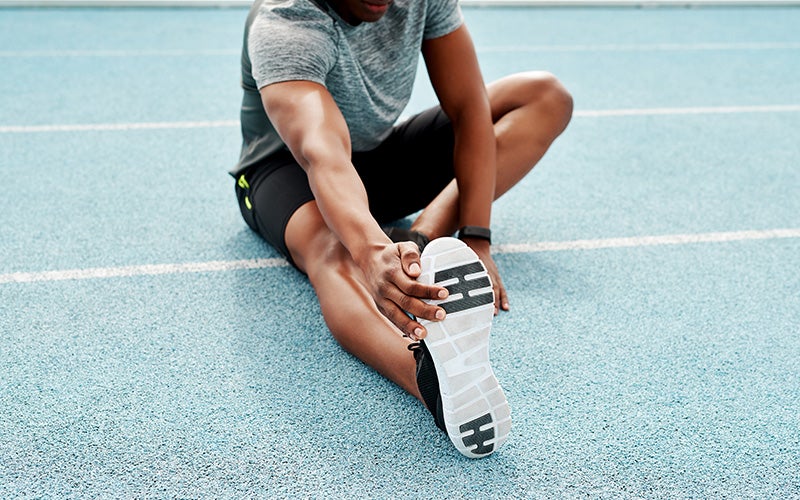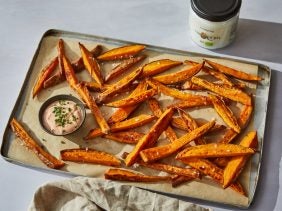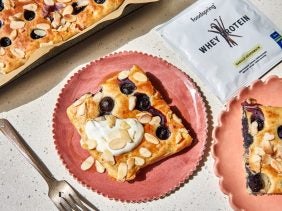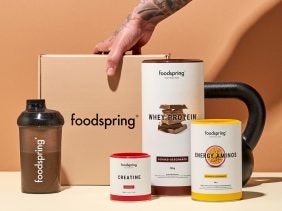Fitness Nutrition: Our 5 best and 5 worst foods
 © foodspring
© foodspring
Only by eating properly can you sustainably improve your fitness and performance. We’ll tell you which 5 foods support your body in achieving your physical goals and which foods are best avoided. Healthy fitness nutrition supports your goals and promotes rapid recovery after exercise.
Do you already know about our high-quality protein products? When you work your body hard, it needs more protein. That makes it even more important to cover your increased needs with the proper fitness nutrition.
Try a protein shake to power up your morning: we want to support your goals with our functional food products. Try them for yourself and find your new favorites.
Discover all our protein products now
Poor Nutrition for Your Fitness Levels: The 5 Flop Foods
1. Carbonated Drinks and Energy Drinks
Sweetened soft drinks are packed full of empty calories in the form of sugar. They offer no nutrients and give only a very short-term energy boost. The sugar passes quickly into your bloodstream, resulting in a rapid and unnatural increase in blood sugar. Your body responds by releasing insulin, causing your blood sugar level to drop rapidly again, which makes you feel weak and hungry.
An insulin spike also inhibits fat burning. Your perfect fitness nutrition plan has no room for sugary drinks. Healthy alternatives: Go for unsweetened drinks like water and tea instead.
2. Rapeseed Oil, Soybean Oil and Corn Oil
Rapeseed oil and other industrially used oils were originally intended as fuel and lubricant and not for human consumption. They have been made suitable for consumption by way of special cultivation and chemical processing and are inexpensive to manufacture.
The special structure of these bad fats leads to an increased risk of infection, especially after intense exercise. The consequences are longer regeneration periods and less physical resilience.
Healthy alternatives: Supplement them with healthy alternatives like olive oil and coconut oil for your fitness diet These oils contain a better ratio of healthy fatty acids.
Coconut oil is especially useful here. Whether you use it cold or warm, the all-rounder even knocks olive oil down a peg. Lauric acid keeps it heat-stable, so no unhealthy trans fats are created while it’s cooked. MCTs deliver instant energy. You just have to try it.
White Flour
Normal white flour (type 550) contains no valuable micronutrients. The vitamins and minerals contained in the chaff are lost during processing. White flour is full of easy-to-digest carbs, which quickly accumulate as unwanted fat deposits. Eating products with white flour before your workout can cause you to “hit the wall” during exercise when these easily-digested carbs run out.
You know what hitting the wall feels like, right? Decreased performance, feeling sluggish? These flours also bypass digestion in the body, which can lead to intestinal disorders like constipation.
Healthy alternatives: Nutritious flours with a higher micronutrient content are ideal. Spelt or rye flour are two good examples. These also have a higher fiber content, which makes them more filling.
4. Fried Foods
French fries and other deep-fried foods are often pre-fried in low-quality fats and then deep-fried again before serving. The fat often remains in the deep-fat fryer at high temperatures (180°C) for a very long time.
Repeatedly reheating the leftover particles in the deep-fat fryer creates decomposition products that change the structure of the fat. In the worst case scenario, these create acrylamide, which is a carcinogen. The above-average fat content of these foods slows down digestion and places an increased burden on the stomach for hours.
The coating on fried foods absorbs large amounts of the low-quality deep-frying fats, which means that you consume excessive amounts of energy, which often leads to sluggishness and lethargy.
Healthy alternatives: Ideally, deep-fried foods should be completely avoided for the purposes of a healthy diet. Go for grilled fish instead of fish fingers, or potato gratin instead of fries.
5. Processed Meats
Prepacked meat is cheap and appealing at first glance because of its attractive packaging. On closer inspection, however, we find that these cheap meats contain a lot of added water (for increased mass). Trace amounts of the pharmaceutical products used while raising the animals find their way into your body from these meats. As a result, the internal organs dealing with neutralising and removing these contaminants are under severe stresses. Your fitness during intense workouts decreases.
Healthy alternatives: Increase the amount of great-tasting, organic-quality meat in your diet. It contains less pollutants and is therefore much better for the body.
Healthy Eating for Your Fitness: The 5 Top Foods
1. Nuts – The Energy Booster Between Meals
Nuts are the perfect, fitness-supporting snack for a healthy diet. Nuts not only contain large amounts of plant protein, but also monounsaturated and polyunsaturated fatty acids, which play an important role in fat reduction. They reduce the amount of bad cholesterol in your blood and improve your overall cholesterol levels long-term. Go for almonds, macadamia and Brazil nuts, for example.
They supply valuable energy for regeneration, especially after exercise. High-quality plant proteins promote muscle regeneration and unsaturated fats combat infection. Nuts also contain valuable antioxidants, which protect the cells after intense workouts. The B vitamins contained in nuts support fat reduction and muscle building.
2. Bananas – Nature’s Potassium Bombs
Bananas are rich in carbohydrates and the micro nutrient potassium. Both of these substances are perfect for replenishing your energy stores after a strenuous workout. Potassium is of primary importance for the electrolyte balance and contributes to optimised stimulus conduction, muscle contraction and energy provision.
2000mg of potassium per day is recommended for adults. Muscle activity and perspiration as a result of intense sporting activities increase the need for potassium. So your fitness diet should include one or two bananas a day. It is that easy to ensure a sufficient supply of this essential nutrient in a balanced and nutritious diet.
3. Goji Berries – The Potent Antioxidant Sources

The little red berries contain enormously high levels of antioxidants. These support your fitness and general health by repairing damaged cells and intercepting free radicals. With two to three helpings per week, the constituents in goji berries can offer protection against vascular wall deposits and cancers.
Goji berries promote intestinal health and digestion by activating the intestinal flora. They are also rich in iron and phytochemicals like carotenoids and can help curb infection processes in the body.
4. Low-fat Quark – The All-rounder
Low-fat quark (also known as fromage frais) contains tons of protein and very little fat. With a biological value of 81, the protein contained in quark is of a higher quality than many meat proteins. This protein consists mainly of casein, which supplies your body with protein long-term. But low-fat quark is not only great food for muscle building.
Combined with fresh fruit, quark supplies just the right nutrients to replenish your energy stores after long endurance workouts and regenerates strained muscles. Low-fat quark plays well with a wide variety of fruits, vegetables, and nuts to create a sweet or savory snack. Perfect if you don’t like the taste on its own. An extra bonus? When applied to the skin, quark can even relieve sports-related inflammations and sprains like swellings and irritations.
5. Whole-grain Pasta – The Classic
In comparison with conventional pasta made with white flour, the wholegrain version has tons more benefits. If you can, try to switch all your pasta to wholegrain.
Unlike white-flour pasta, it is rich in minerals and fiber. The minerals ensure smooth muscle contractions and metabolic functions. The high fiber content in wholegrain pasta makes you feel full for longer and contributes to your intestinal health.
Wholemeal pasta provides a lot of energy for exercise that becomes available slowly and long term because of its high fiber content.
Conclusion: Fitness All Comes Down To The Appropriate Nutrition
You need to do more than just train hard and sweat to be the best you can be. An unhealthy diet that puts unnecessary stress on your body will put a strain on your fitness and performance. A healthy diet, on the other hand, keeps your body fit and gives it all the nutrients it needs for vital metabolic processes. A balanced diet takes care of your physical and mental well-being and improves muscle function. Sticking to a healthier selection of foods, when combined with the right training, will help you continuously improve your performance and be better able to bounce back from external influences on your fitness.
Our Tip: To experience the sweet moments of success, whether it’s body shaping or muscle building, take our free Body Check. Define your goals, calculate your BMI, and get our nutrition and training tips, all tailored to your needs.
start your free body check now
Sources for this article
We at foodspring use only high-quality sources, including peer-reviewed studies, to support the facts within our articles. Read our editorial policy to learn more about how we fact-check and keep our content accurate, reliable, and trustworthy.





























